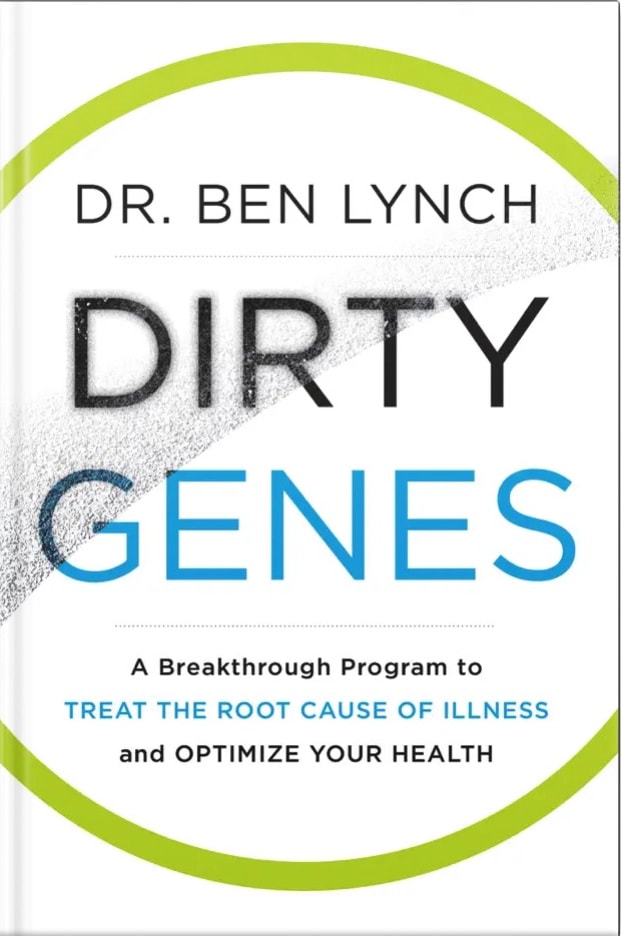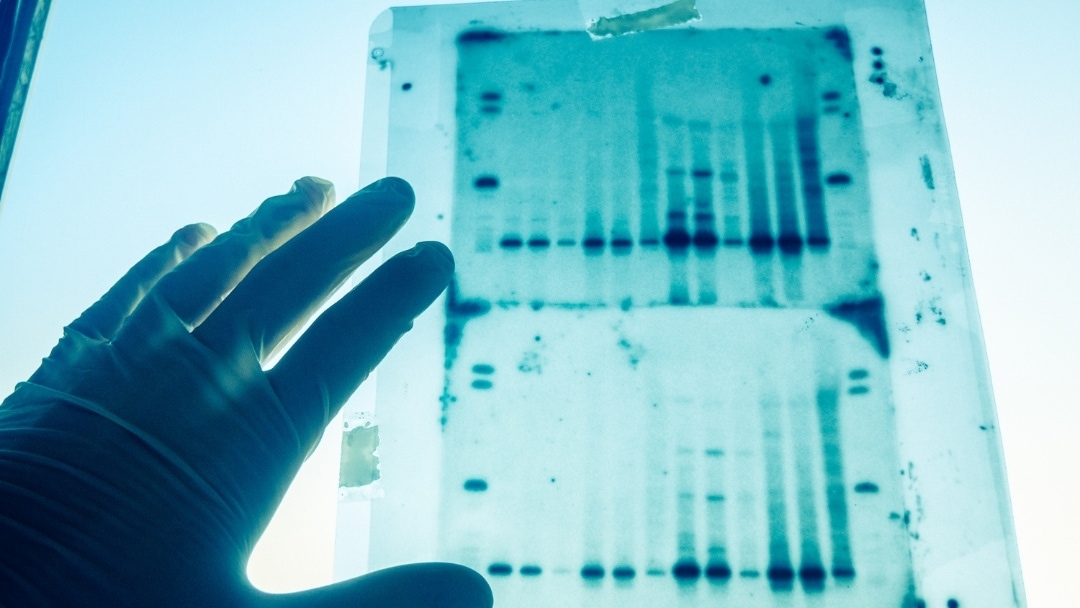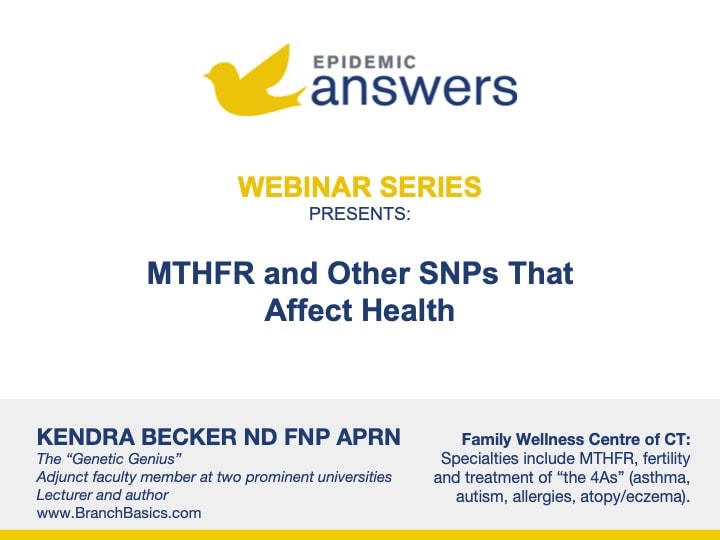What Is Epigenetics?
Epigenetics is the theory that “genetics loads the gun and environment pulls the trigger.” As we are collectively assaulted with ever-increasing amounts of environmental toxins on a daily basis, these toxins have the capability of wrecking our health, leading to genetic mutations that can be passed on to future generations. In other words, our genes become dirty. Dirty Genes discusses the most common genetic mutations, also called SNPs (single-nucleotide polymorphisms), that can be a root cause of chronic health conditions such as:
Common Genetic Mutations
MTHFR
The MTHFR mutation is probably the most commonly known genetic mutation that affects health. It controls methylation, a process that enables vital functions such as:
- Detoxification
- Genetic expression
- Conversion of food to energy
- Cellular protection
- Brain health
- Muscle health
- Production and balancing of neuorotransmitters
- Stress and relaxation respsonses
- Immune response
The profile of someone with this SNP is typically someone who has hard-driving determination and boatloads of motivation, although the downside can be irritability and a hair-trigger temper.
COMT
This SNP affects estrogen metabolism as well as the metabolism of dopamine, norepinephrine and epinephrine, which are neurotransmitters known as catecholamines that affect:
- Mood
- Energy levels
- Ability to calm down
- Ability to sleep
- Ability to focus
Dr. Lynch writes that the upside of a slow COMT is focus, buoyancy and good spirits, while the downside is difficulty in winding down. Conversely, someone with a fast COMT is typically calm but when stressed, this can lead to a lack of motivation and drive.
DAO
DAO affects the body’s response to histamines, which are found in many foods, produced by some gut bacteria and found on bacteria in leftover foods. An oversensitivity to histamine-containing foods can cause allergic responses, food intolerances and exacerbate Mast Cell Activation Syndrome (MCAS). Gut dysbiosis, inflammation, stress and a leaky gut can make the DAO SNP dirtier. People with a dirty DAO are more likely to have symptoms such as:
- Intolerance to citrus, fish, wine, yogurt, sauerkraut, chocolate and aged cheeses
- Frequent episodes of itchy skin, nose and/or eyes
- Low blood pressure
MAOA
The MAOA genetic SNP affects the body’s relationship to the serotonin, norepinephrine and dopamine neurotransmitters. Thus, it can contribute to mood swings, carb cravings, energy level changes and the ability to sleep. A person with this mutation often has energy and self-confidence as well as mood swings, irritability and insomnia. A person with a fast MAOA craves carbs and chocolate, while one with a slow MAOA SNP is easily startled and quick to become anxious or irritated.
Common symptoms of a dirty MAOA are:
- ADHD diagnosis
- Major depression and/or alcoholism in the family
- Addiction to carbohydrates and chocolate
- Feeling better with more protein in the diet
- Quick-trigger aggressiveness
GST/GPX
This set of genetic mutations affects the process of detoxification. Someone with one or both of these mutations is supersensitive to the presence of harmful chemicals. The GST gene affects the ability of the body to transfer glutathione, while the GPX gene affects the ability of glutathione to attach hydrogen peroxide to a toxin so that it can be peed out.
NOS3
The NOS3 mutation affects levels of nitric oxide, a vasodilator that affects blood flow and blood vessel formation; nitric oxide is a major factor in heart health. A person with this SNP more likely has cardiovascular health problems such as stroke, high blood pressure or heart attacks.
PEMT
Because the PEMT mutation affects the health of cell walls, the brain and the liver, it can be a factor in conditions ranging from gallstones, fatty liver, digestive problems and attention problems. The PEMT gene affects the body’s ability to make phosphatidylcholine, a key ingredient of cell membranes. Because of this function, a deficiency of phosphatidylcholine plays a critical role in mitochondrial dysfunction and the body’s ability to effectively generate energy.
A dirty PEMT is also related to fatty liver syndrome because phosphatidylcholine helps bile flow smoothly out of the gallbladder to aid in digestion and also helps move triglycerides out of the liver.
PEMT also helps produce choline when there’s not enough in the diet. Choline helps with complex language development and is used to make the acetylcholine neurotransmitter, which is important for focus and concentration.
How to Clean Your Genes
Dr. Lynch’s Clean Genes Protocol is built upon a solid foundation of Soak and Scrub, which includes:
- Eating a clean diet and removing potential sources of food sensitivities and intolerances
- Exercising
- Getting restful sleep
- Reducing exposure to environmental toxins
- Reducing total load of stressors
He writes that if you’re not adhering to this foundation, “many of your genes are going to act as though they had SNPs even if they weren’t actually born with them.”
In the book, he explains how to Soak and Scrub for two weeks, Spot Clean for two weeks and then Keep Clean for life, all while addressing common genetic mutations. Following this protocol can silence the expression of these mutations and lead to less symptoms and better health.
After building up a solid foundation of Soak and Scrub, which isn’t a temporary program but rather a lifestyle to maintain clean genes, Dr. Lynch helps readers troubleshoot remaining symptoms from these seven dirty genes with specific recommendations for when, how and what kind of supplements, lab tests and lifestyle changes could help and why.
In Conclusion
What’s helpful to know is that Dr. Lynch doesn’t recommend that people immediately have their genetic SNPs tested. Surprisingly, Dr. Lynch advises that “In most cases, though, genetic testing isn’t necessary” because following the the Clean Genes Protocol is often enough to improve many symptoms on its own.
“When you support your genes with the right diet, exercise, sleep, protection from chemicals, and stress relief, your born-dirty genes are much more manageable. When your body and/or mind undergoes stress, all your genes get dirty… and your born-dirty genes start to give you trouble.”
Ultimately, we have the ability to rewrite our genetic destiny, and this can be incredibly empowering. With Dirty Genes as a guide, readers can choose to navigate succesfully around the toxic insults that continue to compound in our environment. This book should be a priority pick for your health journey, especially for those wishing to understand how their genes could affect their health.
About Ben Lynch ND
Dr. Ben Lynch is the best-selling author of Dirty Genes and president of Seeking Health, a company that helps educate both the public and health professionals on how to overcome genetic dysfunction. He received his doctorate in naturopathic medicine from Bastyr University. He lives in Seattle, WA with his wife and three sons.
He established Seeking Health Educational Institute (SHEI), a website for both health professionals and lay people who want to learn more about nutrigenomics and methylation. Drbenlynch.com is now one of the most trusted resources on genetics for health professionals and laypersons worldwide.
In 2015, he developed StrateGene, a unique approach to helping people develop natural strategies for overcoming genetic abnormalities that pose the greatest challenges in people’s health and then provides comprehensive plans for overcoming those challenges through diet, environment and lifestyle. You can find out more about him at his websites drbenlynch.com and seekinghealth.com.

Still Looking for Answers?
Visit the Epidemic Answers Practitioner Directory to find a practitioner near you.
Join us inside our online membership community for parents, Healing Together, where you’ll find even more healing resources, expert guidance, and a community to support you every step of your child’s healing journey.
Sources & References
Arnold, P.A., et al. Glutamate transporter gene SLC1A1 associated with obsessive-compulsive disorder. Arch Gen Psychiatry. 2006 Jul;63(7):769-76.
Bidwell, L.C., et al. Genetic influences on ADHD symptom dimensions: Examination of a priori candidates, gene-based tests, genome-wide variation, and SNP heritability. Am J Med Genet B Neuropsychiatr Genet. 2017 Jun;174(4):458-466.
Bowers, K., et al. Glutathione pathway gene variation and risk of autism spectrum disorders. J Neurodev Disord. 2011 Jun;3(2):132-43.
Esmaiel, N.N., et al. The potential impact of COMT gene variants on dopamine regulation and phenotypic traits of ASD patients. Behav Brain Res. 2020 Jan 27;378:112272.
Hausman-Cohen, S., et al. Utilizing Genomically Targeted Molecular Data to Improve Patient-Specific Outcomes in Autism Spectrum Disorder. Int J Mol Sci. 2022 Feb 16;23(4):2167.
Hausman-Cohen, S.R., et al. Genomics of Detoxification: How Genomics can be Used for Targeting Potential Intervention and Prevention Strategies Including Nutrition for Environmentally Acquired Illness. J Am Coll Nutr. 2020 Feb;39(2):94-102.
Hwang, I.W., et al. Association of Monoamine Oxidase A (MAOA) Gene uVNTR and rs6323 Polymorphisms with Attention Deficit and Hyperactivity Disorder in Korean Children. Medicina (Kaunas). 2018 May 18;54(3):32.
Li, Y., et al. Association between MTHFR C677T/A1298C and susceptibility to autism spectrum disorders: a meta-analysis. BMC Pediatrics. 2020(20)449.
Meng, X., et al. Association between MTHFR (677C>T and 1298A>C) polymorphisms and psychiatric disorder: A meta-analysis. PLoS One. 2022 Jul 14;17(7):e0271170.
Rahbar, M.H., et al. Detoxification Role of Metabolic Glutathione S-Transferase (GST) Genes in Blood Lead Concentrations of Jamaican Children with and without Autism Spectrum Disorder. Genes (Basel). 2022 May 29;13(6):975.
Resseguie, M.E., et al. Aberrant estrogen regulation of PEMT results in choline deficiency-associated liver dysfunction. J Biol Chem. 2011 Jan 14;286(2):1649-58.
Sadeghiyeh. T., et al. Association of MTHFR 677C > T and 1298A > C polymorphisms with susceptibility to attention deficit and hyperactivity disorder. Fetal Pediatr Pathol. 2020 Oct;39(5):422-429.
Way, H., et al. Genomics as a Clinical Decision Support Tool: Successful Proof of Concept for Improved ASD Outcomes. J Pers Med. 2021 Jun 24;11(7):596.
Resources
Books
Lynch, Ben. Dirty Genes: A Breakthrough Program to Treat the Root Cause of Illness and Optimize Your Health. HarperOne, 2020.
Walsh, William J. Nutrient Power: Heal Your Biochemistry and Heal Your Brain. SkyHorse, 2014.
Yasko, Amy. Feel Good Nutrigenomics. Neurological Research Institute, 2014.
Websites
More To Explore
Join our email list to get free healing resources delivered right to your inbox.
Join our community

This information is not a substitute for medical advice, treatment, diagnosis, or consultation with a medical professional. It is intended for general informational purposes only and should not be relied on to make determinations related to treatment of a medical condition. Epidemic Answers has not verified and does not guarantee the accuracy of the information provided in this document.
© Copyright 2013-2024 Epidemic Answers. All rights reserved. Privacy Policy | Terms of Service | Disclaimer | Website by fuseStarter




